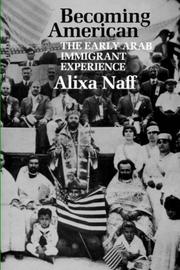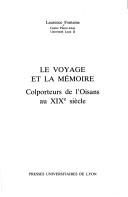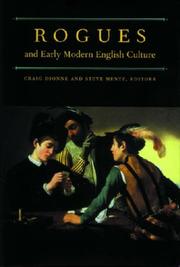| Listing 1 - 8 of 8 |
Sort by
|

ISBN: 0585108099 9780585108094 0809318962 9780809318964 Year: 1993 Publisher: Carbondale Southern Illinois University Press
Abstract | Keywords | Export | Availability | Bookmark
 Loading...
Loading...Choose an application
- Reference Manager
- EndNote
- RefWorks (Direct export to RefWorks)
A unique study in American immigra-tion and assimilation history that also provides a special view of one of the smaller ethnic groups in American society. Naff focuses on the pre-World War I pio-neering generation of Arabic-speaking immigrants, the generation that set the patterns for settlement and assimilation. Unlike many immigrants who were drawn to the United States by dreams of industrial jobs or to escape religious or economic persecution, most of these ar-tisans and owners of small, disconnected plots of land came to America to engage in the enterprise of peddling. Most planned to stay two or three years and re-turn to their homelands.
Syrian Americans --- Arab Americans --- Peddling --- Gender & Ethnic Studies --- Social Sciences --- Ethnic & Race Studies --- Hawking --- Huckstering --- Peddlers and peddling --- Direct selling --- Arabs --- Ethnology --- Syrians --- History --- History.

ISBN: 2729702199 2729709959 9782729702199 Year: 2019 Publisher: Lyon : Presses universitaires de Lyon,
Abstract | Keywords | Export | Availability | Bookmark
 Loading...
Loading...Choose an application
- Reference Manager
- EndNote
- RefWorks (Direct export to RefWorks)
Chaque automne il part, laissant sa terre et sa famille. Il est fleuriste et parcourt le monde, du Costa-Rica aux confins de la Russie, offrant aux Grands des fleurs et du rêve. Il est mercier et chaque hiver retrouve les mêmes chemins, les mêmes clients. Il est marchand de simples ou quincailler, et fait le médecin, le vétérinaire, le mendiant souvent, le vagabond toujours. Les lettres échangées avec le pays, les livres de comptes tenus en tournée, le registre du banquier qui avance les fonds nous racontent les pratiques quotidiennes, les espérances et les risques du métier, les inquiétudes et la tristesse d'être séparé des siens. Et l'on saisit alors une activité dont la mémoire des montagnes a voulu se souvenir comme l'âge d'or de la liberté perdue.
Peddlers and peddling --- Peddling --- History --- Oisans (France) --- Social life and customs --- Social life and customs. --- Hawking --- Huckstering --- Direct selling --- Peddlers and peddling - France - Oisans - History - 19th century --- Peddling - France - Alps, French - History --- Oisans (France) - Social life and customs --- Oisans (France) - History --- colporteur --- récit --- métier --- témoignage --- émigration --- itinérant --- voyage
Book
ISBN: 1920596178 9781920596170 9781920596118 1920596119 Year: 2015 Publisher: [Cape Town]
Abstract | Keywords | Export | Availability | Bookmark
 Loading...
Loading...Choose an application
- Reference Manager
- EndNote
- RefWorks (Direct export to RefWorks)
Entrepreneurship --- Informal sector (Economics) --- Peddlers --- Street vendors --- Xenophobia --- Immigrants --- Entrepreneur --- Intrapreneur --- Capitalism --- Business incubators --- Hidden economy --- Parallel economy --- Second economy --- Shadow economy --- Subterranean economy --- Underground economy --- Artisans --- Economics --- Small business --- Hawkers --- Hucksters --- Peddlers and peddling --- Sales personnel --- Street people (Street vendors) --- Vendors, Street --- Merchants --- Vending stands --- Zenophobia --- Phobias --- Emigrants --- Foreign-born population --- Foreign population --- Foreigners --- Migrants --- Persons --- Aliens --- Economic conditions.

ISBN: 1282591495 9786612591495 0472025163 9780472025169 9780472031771 0472031775 0472113747 9780472113743 Year: 2004 Publisher: Ann Arbor University of Michigan Press
Abstract | Keywords | Export | Availability | Bookmark
 Loading...
Loading...Choose an application
- Reference Manager
- EndNote
- RefWorks (Direct export to RefWorks)
A definitive collection of critical essays on the literary and cultural impact of the early modern rogue
English literature --- Rogues and vagabonds in literature. --- Rogues and vagabonds --- Literature and society --- Peddling --- Vagrancy --- Outlaws --- Vagrancy in literature. --- Outlaws in literature. --- Bandits --- Criminals --- Brigands and robbers --- Outcasts --- Vagabondage --- Crime --- Begging --- Hawking --- Huckstering --- Peddlers and peddling --- Direct selling --- Literature --- Literature and sociology --- Society and literature --- Sociology and literature --- Sociolinguistics --- Vagabonds --- Vagrants --- Homeless persons --- Tramps --- History and criticism. --- History --- History. --- Social aspects --- Outlaws in literature --- Rogues and vagabonds in literature --- Vagrancy in literature --- History and criticism
Book
ISBN: 0821445014 9780821445013 9780821421154 0821421158 9780821421161 0821421166 Year: 2014 Publisher: Athens, Ohio
Abstract | Keywords | Export | Availability | Bookmark
 Loading...
Loading...Choose an application
- Reference Manager
- EndNote
- RefWorks (Direct export to RefWorks)
In Making Modern Girls, Abosede A. George examines the influence of African social reformers and the developmentalist colonial state on the practice and ideology of girlhood as well as its intersection with child labor in Lagos, Nigeria. It draws from gender studies, generational studies, labor history, and urban history to shed new light on the complex workings of African cities from the turn of the twentieth century through the nationalist era of the 1950's. The two major schemes at the center of this study were the modernization project of elite Lagosian women and the salvationist project
Girls --- Child labor --- Peddlers --- Public welfare --- Social change --- Change, Social --- Cultural change --- Cultural transformation --- Societal change --- Socio-cultural change --- Social history --- Social evolution --- Benevolent institutions --- Poor relief --- Public assistance --- Public charities --- Public relief --- Public welfare reform --- Relief (Aid) --- Social welfare --- Welfare (Public assistance) --- Welfare reform --- Human services --- Social service --- Children --- Females --- Young women --- Hawkers --- Hucksters --- Peddlers and peddling --- Sales personnel --- Street vendors --- Employment of children --- Labor --- Age and employment --- History --- Government policy --- Employment --- Lagos (Nigeria) --- Great Britain --- Eko (Nigeria) --- Social conditions --- Colonies --- Social policy.
Book
ISBN: 1920596224 9781920596224 9781920596187 1920596186 Year: 2016 Publisher: Waterloo, Ontario : Southern African Migration Programme,
Abstract | Keywords | Export | Availability | Bookmark
 Loading...
Loading...Choose an application
- Reference Manager
- EndNote
- RefWorks (Direct export to RefWorks)
This report provides a rich view of the activities of migrant entrepreneurs in the informal economy of Johannesburg. It is hoped that the information will facilitate understanding of the informal sector and its potential, and not just in the context of migrant entrepreneurs. The informal economy plays a significant role in the entrepreneurial landscape of the City of Johannesburg and is patronized by most of the city's residents. The research presented here challenges commonly held opinions about migrant entrepreneurs in the City of Johannesburg and shows that they do not dominate the informal economy, which remains largely in the hands of South Africans. In late 2013, the City, through Operation Clean Sweep, removed up to 8,000 traders from the city's streets. As this and recent xenophobic attacks demonstrate, Johannesburg can be a hostile place in which to operate a business as an informal economy migrant entrepreneur. Instead of trying to sweep the streets clean of these small businesses, government at national, provincial and city levels should develop policies to grow the SMME economy, develop township economies, and manage the informal economy and street trading. They need to incorporate the businesses owned by migrant entrepreneurs, rather than exclude and demonize them. These businesses make an invaluable contribution to Johannesburg's economy despite operating in a non-enabling political and policy environment.
Entrepreneurship --- Informal sector (Economics) --- Peddlers --- Street vendors --- Immigrants --- Immigrant business enterprises --- Immigrant-owned business enterprises --- Business enterprises --- Emigrants --- Foreign-born population --- Foreign population --- Foreigners --- Migrants --- Persons --- Aliens --- Street people (Street vendors) --- Vendors, Street --- Merchants --- Vending stands --- Hawkers --- Hucksters --- Peddlers and peddling --- Sales personnel --- Hidden economy --- Parallel economy --- Second economy --- Shadow economy --- Subterranean economy --- Underground economy --- Artisans --- Economics --- Small business --- Entrepreneur --- Intrapreneur --- Capitalism --- Business incubators --- Economic conditions. --- Johannesburg (South Africa) --- Johannesburg --- Yohanesburg (South Africa) --- Jo'burg (South Africa) --- Emigration and immigration. --- E-books --- Refugees --- Social conditions. --- Displaced persons --- Deportees --- Exiles
Book

ISBN: 9781782388357 1782388354 9781782388340 1782388346 Year: 2015 Publisher: New York Oxford
Abstract | Keywords | Export | Availability | Bookmark
 Loading...
Loading...Choose an application
- Reference Manager
- EndNote
- RefWorks (Direct export to RefWorks)
Examining street vending as a global, urban, and informalized practice found both in the Global North and Global South, this volume presents contributions from international scholars working in cities as diverse as Berlin, Dhaka, New York City, Los Angeles, Calcutta, Rio de Janeiro, and Mexico City. The aim of this global approach is to repudiate the assumption that street vending is usually carried out in the Southern hemisphere and to reveal how it also represents an essential—and constantly growing—economic practice in urban centers of the Global North. Although street vending activities vary due to local specificities, this anthology illustrates how these urban practices can also reveal global ties and developments.
Street vendors --- Peddling --- Informal sector (Economics) --- Urban economics --- Hidden economy --- Parallel economy --- Second economy --- Shadow economy --- Subterranean economy --- Underground economy --- Artisans --- Economics --- Small business --- Hawking --- Huckstering --- Peddlers and peddling --- Direct selling --- Street people (Street vendors) --- Vendors, Street --- Merchants --- Peddlers --- Vending stands --- Social conditions --- Economic conditions --- Social aspects --- Economic aspects --- anthology. --- anthropology. --- berlin. --- business. --- cities. --- city life. --- cooking. --- culture. --- diverse economies. --- economic activity. --- economic practices. --- engaging. --- ethnicity. --- family. --- food and wine. --- global ties. --- harlem. --- history. --- local economies. --- local food. --- marginalized economies. --- mexico city. --- neighbors. --- new york city. --- northern hemisphere. --- nostalgia. --- opportunism. --- retail. --- small business. --- social issues. --- street food. --- street vending. --- street vendors. --- urban centers. --- urban practices.
Book
ISBN: 9004252851 9004252843 1306070929 9789004252844 9789004252851 Year: 2014 Publisher: Leiden Brill
Abstract | Keywords | Export | Availability | Bookmark
 Loading...
Loading...Choose an application
- Reference Manager
- EndNote
- RefWorks (Direct export to RefWorks)
Itinerant salesmen, also called pedlars, street hawkers, hucksters and ballad singers are considered to be the most important distributors of popular printed matter in Europe between 1600 and 1850. A general assumption is that the pedlar travelling from town to countryside was strongly distinct from the role of the established booksellers in the towns, selling books to the educated and affluent buyer. The commercial position of the urban pedlars, however, is very often underestimated. In this book, therefore, the itinerant book trade is studied in an English and Dutch, urban context, leading to a new perspective on the role of the pedlars as an intermediary between the established booksellers and an extensive, socially diverse reading public.
Book industries and trade -- England -- History -- 17th century.
---
Book industries and trade -- England -- History -- 18th century.
---
Book industries and trade -- Netherlands -- History -- 17th century.
---
Book industries and trade -- Netherlands -- History -- 18th century.
---
Book industries and trade -- Social aspects -- England.
---
Book industries and trade -- Social aspects -- Netherlands.
---
Peddling -- England -- History -- 17th century.
---
Peddling -- England -- History -- 18th century.
---
Peddling -- Netherlands -- History -- 17th century.
---
Peddling -- Netherlands -- History -- 18th century.
---
Book industries and trade
---
Peddling
---
Education
---
Social Sciences
---
Book Studies & Arts
---
History
---
Social aspects
---
Book trade
---
Hawking
---
Huckstering
---
Peddlers and peddling
---
Colporteurs et colportage
---
655.42 <492>
---
655.42 <41>
---
094.1 <41>
---
Direct selling
---
Boekhandel--algemeen--Nederland
---
Boekhandel--algemeen--Verenigd Koninkrijk van Groot-Brittannië en Noord-Ierland
---
Oude drukken: bibliografie--
| Listing 1 - 8 of 8 |
Sort by
|

 Search
Search Feedback
Feedback About UniCat
About UniCat  Help
Help News
News